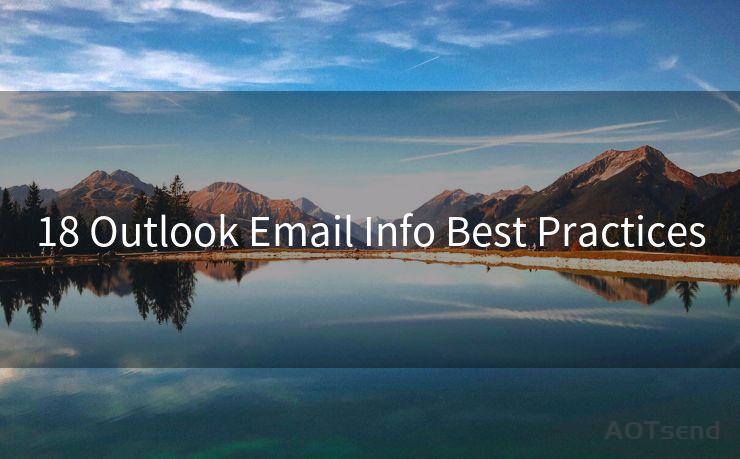18 Outlook Email Info Best Practices




In the modern workplace, email remains a crucial tool for communication. Microsoft Outlook, being one of the most popular email clients, offers a robust platform for managing emails efficiently. However, to make the most of Outlook, it's essential to follow best practices that enhance productivity and minimize confusion. Here are 18 Outlook email best practices to help you streamline your communication.
1. Organize Your Inbox
Keep your inbox clean and organized. Use folders and subfolders to categorize emails, and create rules to automatically sort incoming messages.
2. Use Meaningful Subject Lines
Craft clear and concise subject lines that summarize the email's content. This helps recipients understand the email's purpose at a glance.
3. Prioritize Your Emails
Utilize Outlook's flagging and color-coding features to prioritize emails. This visual cue helps you and your team identify urgent or important messages quickly.
4. Write Concise Messages
Keep your emails short and to the point. Avoid lengthy paragraphs and get straight to the point. Bullet points can help organize information for easy reading.
5. Use Templates for Repetitive Tasks
Create templates for frequently sent emails to save time and ensure consistency in your communication.
6. Attach Files Wisely
When attaching files, consider file size and relevance. Use links to share large files or utilize cloud storage solutions to avoid inbox clutter.
7. Proofread Before Sending
Always proofread your emails for grammar and spelling errors. A professional and error-free email leaves a positive impression.

8. Use Proper Formatting
Make use of bold, italics, and underlining to emphasize key points. However, avoid overusing these formatting options to maintain readability.
9. CC and BCC Sparingly
Only include additional recipients when necessary. Overuse can lead to inbox clutter and privacy concerns.
10. Respond Promptly
Aim to respond to emails within 24 hours, even if it's just to acknowledge receipt and indicate when a fuller response will be provided.
11. Utilize Out-of-Office Replies
Set up automatic replies when you're away, informing senders of your absence and when they can expect a response.
12. Archive Old Emails
Regularly archive or delete old emails to keep your inbox manageable and improve performance.
13. Use Signatures
Create a professional email signature with your contact information for a consistent and professional look.
14. Encrypt Sensitive Information
When sending sensitive information, use encryption to ensure data security.
15. Avoid Using All Caps
Writing in all caps is often interpreted as shouting and can be perceived as rude or aggressive.
🔔🔔🔔
【AOTsend Email API】:AOTsend is a Managed Email Service for sending transactional emails. Support Email Types: reminders, authentication, confirmations, notifications, verification codes, invoices, password resets, account activations, billing statements, two-factor authentication (2FA), and one-time passwords (OTP) emails, etc. $0.28 per 1000 Emails. 99% Delivery, 98% Inbox Rate.
You might be interested in:
Why did we start the AOTsend project, Brand Story?
What is a Managed Email API, How it Works?
Best 25+ Email Marketing Platforms (Authority,Keywords&Traffic Comparison)
Best 24+ Email Marketing Service (Price, Pros&Cons Comparison)
Email APIs vs SMTP: How they Works, Any Difference?
16. Leverage Delayed Send
If you're working late or want to ensure your email is sent during business hours, use Outlook's "Delay Delivery" feature.
17. Be Mindful of Tone
Email communication can sometimes be misinterpreted. Ensure your tone is professional, friendly, and respectful.
18. Follow Up
If you don't receive a response, politely follow up after a reasonable period.
By adhering to these Outlook email best practices, you can enhance the efficiency and effectiveness of your email communication, ensuring clear, timely, and professional exchanges with your colleagues and clients.




Scan the QR code to access on your mobile device.
Copyright notice: This article is published by AotSend. Reproduction requires attribution.
Article Link:https://www.mailwot.com/p6711.html



